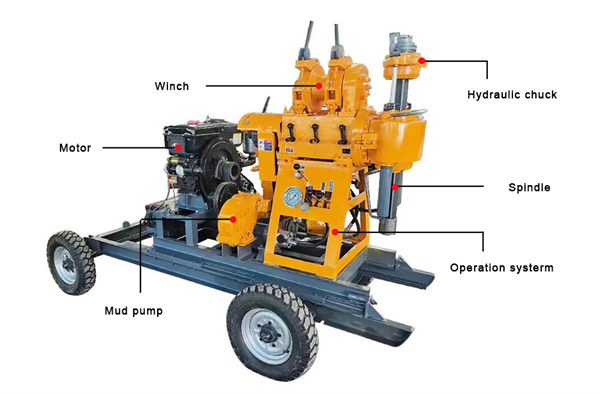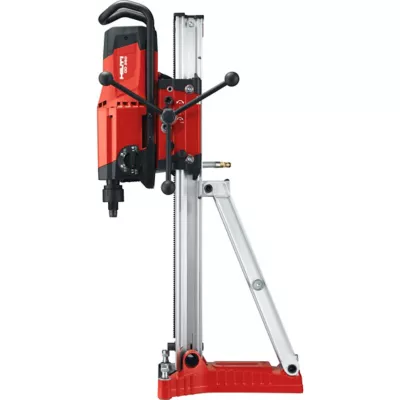The top reasons for choosing Core Drilling Equipment
Core Drilling Equipment: Secret Facts and Insights on Its Function in Source Expedition
Core exploration devices is necessary in resource exploration, making it possible for the extraction of round examples from the Earth's subsurface. This process allows geologists to examine mineral down payments and understand geological formations. Different techniques and modern technologies boost performance and security in exploration operations. The efficiency of core exploration can be influenced by multiple aspects. Recognizing these aspects is crucial for enhancing source administration and minimizing environmental impacts. What particular innovations and factors to consider form this significant area?
Overview of Core Drilling Equipment
Core boring devices is necessary for obtaining cylindrical samples from the Planet's subsurface, facilitating geological exploration and resource assessment. This specialized equipment typically comprises a drill rig, core barrel, and different drill bits developed for different geological conditions. The drill gear gives the required power and assistance, enabling for deep penetration into the earth. The core barrel records the removed material, guaranteeing minimal disturbance to the sample, which is vital for accurate evaluation. Pierce bits vary in design and material, frequently including diamond or tungsten carbide to improve sturdiness and cutting performance.
Additionally, core exploration tools may consist of supporting elements such as water pumps for air conditioning and lubrication, along with tasting tools for dealing with and accumulating core examples. Together, these aspects enable rock hounds and engineers to collect essential information relating to natural resource, groundwater sources, and other subsurface characteristics, inevitably informing expedition and extraction strategies.
Kinds of Core Exploration Methods
While different core boring approaches exist to satisfy particular geological and task demands, each method provides distinct advantages and applications. The most common methods include ruby core drilling, which utilizes diamond-impregnated bits for efficient reducing through acid rock, making it perfect for mineral exploration. Alternatively, wireline coring permits the rapid retrieval of core samples, minimizing disturbance and guaranteeing high-grade data collection. Reverse flow exploration is favored for its rate and effectiveness in soft formations, as it brings cuttings to the surface rapidly. Furthermore, air core boring is usually used for shallow, unconsolidated products, giving a cost-effective remedy for preliminary evaluations. Each approach has one-of-a-kind operational demands and is selected based upon variables such as deepness, rock kind, and project objectives. Comprehending these differed techniques enables geologists and engineers to choose the most ideal strategy for their specific exploration needs.
Technological Developments in Core Boring
Current technological improvements in core exploration have actually significantly changed the sector, specifically via the intro of automated core tasting techniques. These developments boost effectiveness and accuracy, enabling for more trustworthy information collection. Additionally, boosted drill bit designs have actually boosted penetration prices and durability, further maximizing core drilling procedures.
Automated Core Sampling Techniques
As developments in modern technology proceed to reshape various markets, automated core sampling methods have become a game-changer in core drilling approaches. These innovations simplify the sampling procedure by lessening human treatment and improving precision in information collection. Automated systems use sophisticated robotics and sensing units to assure exact core removal and analysis, decreasing the danger of contamination and human error. Furthermore, real-time data acquisition enables instant assessment of core samples, assisting in quicker decision-making in source expedition. The integration of automation not just raises performance yet additionally substantially enhances safety and security by lowering the need for employees in hazardous atmospheres. In general, automated core sampling methods are changing just how engineers and geologists come close to subsurface analysis, leading to even more enlightened exploration approaches.
Boosted Drill Little Bit Styles
Boosted drill bit styles have actually considerably changed core exploration procedures by including sophisticated products and innovative geometries that enhance efficiency and longevity. Recent advancements include the usage of polycrystalline ruby compact (PDC) bits, which supply exceptional firmness and use resistance, making it possible for much deeper infiltration prices and prolonged life. In addition, enhanced air conditioning and lubrication systems have actually been incorporated to reduce rubbing and warmth generation, thereby enhancing performance. Designs featuring specialized reducing frameworks permit much better rock fragmentation and core recuperation, reducing the danger of damages to useful examples. The incorporation of sensing units and smart innovations additionally aids in real-time surveillance and performance evaluation, making certain that boring operations are not just efficient however also cost-efficient, marking a significant development in core exploration approaches.
Applications of Core Exploration in Resource Expedition
Core drilling plays an essential duty in resource exploration by facilitating mineral source evaluation, which is important for determining and measuring beneficial down payments. Moreover, it improves geological research study by giving vital information that informs numerous clinical research studies. In enhancement, core boring is critical in environmental effect studies, permitting a far better understanding of the possible results of resource removal on ecological communities.
Mineral Source Assessment
How can core drilling techniques considerably add to mineral source analysis? Core boring plays a vital function in precisely establishing the high quality and quantity of mineral deposits. By extracting cylindrical samples from various depths, geologists obtain a direct representation of subsurface materials. This enables exact assessment of mineral composition, grade, and framework, which is essential for educated decision-making in resource growth. Furthermore, core boring assists in the identification of geological attributes and abnormalities, enhancing understanding of mineralization processes. The data gotten through this technique is important for source estimate and plays a considerable duty in financial usefulness studies. Ultimately, core exploration is an indispensable device for progressing mineral resource assessments in expedition projects.
Geological Research Improvement
Advancing geological research, core drilling strategies offer vital insights into mineral sources and subsurface formations. By removing cylindrical samples from the Earth's crust, rock hounds can evaluate the physical, chemical, and mineralogical buildings of numerous strata. This information is essential for understanding geological history, recognizing prospective resource deposits, and reviewing the stability of extraction procedures. Core samples reveal info regarding rock types, architectural geology, and liquid motion, which are critical in establishing exact geological versions. Furthermore, advancements in core exploration technology, such as improved boring liquids and bit styles, enhance the precision and efficiency of example collection. In general, the assimilation of core boring right into geological study significantly contributes to informed decision-making in source exploration and administration.
Ecological Impact Studies
While evaluating the environmental influence of resource exploration, core drilling acts as an important device for collecting information that notifies lasting techniques (Core Drilling Equipment). This strategy allows researchers to get subsurface examples, allowing them to analyze dirt and rock compositions, groundwater high quality, and potential contamination. By evaluating these examples, environmental researchers can determine the eco-friendly effects of resource removal activities. Additionally, core drilling anchor aids in the development of mitigation strategies to decrease damage to communities. The data gathered also supports governing conformity, ensuring that exploration tasks comply with ecological requirements. Inevitably, core drilling not just boosts understanding of geological developments yet also advertises responsible source management, stabilizing expedition needs with environmental management
Key Aspects Affecting Core Boring Performance
Core exploration performance is greatly influenced by numerous vital aspects that establish the success of boring procedures. One essential aspect is the selection of exploration equipment, which influences infiltration prices and core recovery. The style and problem of drill bits play an essential role, as they have to be fit to the geological problems came across. Furthermore, the boring strategy utilized, such as rotary or ruby exploration, can significantly influence performance.
One more essential factor is the experience of the exploration team. Experienced operators can maximize drilling criteria, lowering downtime and improving efficiency. The geological characteristics of the website, including rock hardness and fracturing, also affect piercing rate and effectiveness. Correct preparation and project management are necessary in working with sources and reducing delays. Jointly, these factors add to the total efficiency of core boring operations, eventually influencing resource expedition outcomes.
Ecological Considerations in Core Exploration Procedures
Environmental considerations play a crucial duty in core drilling operations, as they straight impact ecological communities and neighborhood areas. These procedures can disrupt habitats, resulting in biodiversity loss and dirt erosion. Using hefty machinery may give off greenhouse gases and environmental pollution, affecting both wild animals and human populaces close by.
To reduce these results, operators need to follow rigorous environmental guidelines and take on sustainable practices. This includes using green exploration fluids, handling waste effectively, and restoring sites post-drilling. In addition, engaging with local neighborhoods can foster openness and support, making certain that exploration tasks do not endanger public health and wellness or land use.

Regularly Asked Questions
What Precaution Are Required When Operating Core Boring Devices?

Just How Is Core Sample Top Quality Assessed After Exploration?
Core website here sample quality is examined via aesthetic examination, measurement of physical residential properties, and lab evaluation. Factors like healing price, core stability, and contamination levels are reviewed to ensure accurate representation of subsurface conditions.
What Are the Expenses Associated With Core Boring Projects?
Expenses connected with core drilling jobs include devices service, labor, transportation, website prep work, and sampling. In addition, costs for ecological licenses, site remediation, and analysis add to the total monetary investment required for successful boring procedures.
Exactly How Does Climate Affect Core Exploration Operations?
Weather condition considerably affects core boring operations. Rainfall, snow, or extreme temperature levels can impede progress, influence tools efficiency, and produce safety hazards - Core Drilling Equipment. Proper preparation and organizing are necessary to reduce weather-related disturbances in exploration tasks
What Accreditations Are Needed for Core Drilling Professionals?
Core boring experts generally require qualifications such as the National Institute for Certification in Design Technologies (NICET) and OSHA safety and security training. Added state-specific licenses may also be needed to establish conformity with neighborhood guidelines and safety and security criteria.
